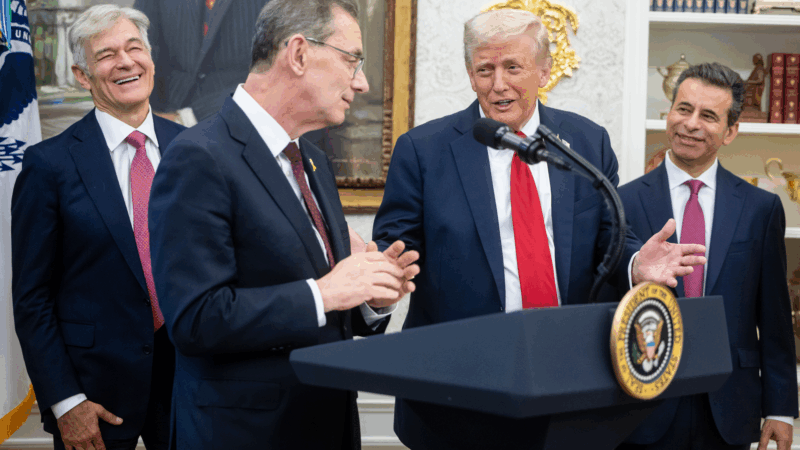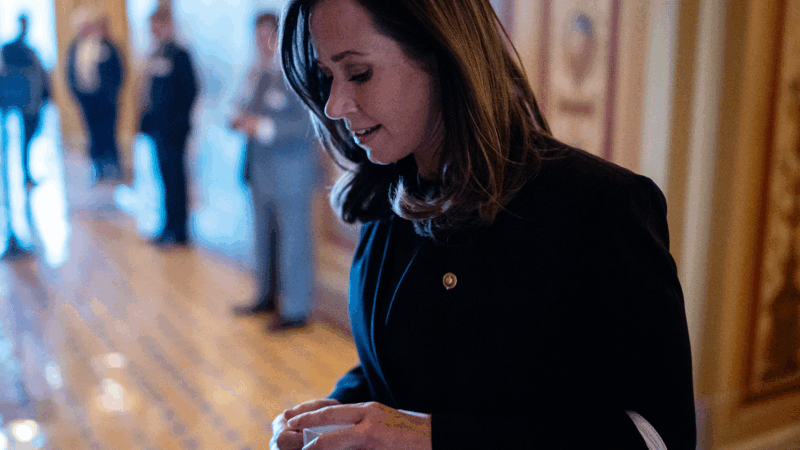President announces TrumpRx website for drugs, and pricing deal with Pfizer
President Trump on Tuesday announced a deal with Pfizer to sell its drugs directly to consumers at discounted prices. They’ll be available through a website operated by the federal government called TrumpRx.gov. He said similar deals with other drugmakers are in the works.
The new website is part of a broader initiative the administration says is aimed at bringing prices paid by Americans, including Medicaid patients, more in line with those paid in other developed countries. The idea is sometimes called most-favored-nation pricing. Under the deal, Pfizer agreed to charge the same price for new drugs in developed countries and the U.S.
“The American consumers have been subsidizing research and development for the entire planet,” Trump said in a press conference, joined by his health team and Pfizer CEO Albert Bourla. “They put all of that on us, and yet they were the beneficiaries too. So it’s been changed.”
“I think today we are turning the tide, and we are reversing an unfair situation,” Pfizer’s Bourla said during the briefing.
The TrumpRx.gov website is expected to launch sometime in 2026, and would take consumers to pharmaceutical companies’ direct-to-consumer websites to fulfill orders, according to senior administration officials who briefed reporters on the condition of anonymity.
Direct-to-consumer prices for Pfizer drugs on TrumpRx.gov will be 50% lower on average, according to a company press release. But there was a lack of important details on how the discounts were calculated. “Specific terms of the agreement remain confidential,” the release said.
Discount website would be for patients not using insurance
Other countries mostly pay less for brand-name prescription drugs than the U.S. because they have government health systems that set drug prices. By and large, the U.S. doesn’t set prices, so the drug companies can charge what the market will bear.
The website deals would only be accessible for patients not using their health insurance, according to one of the government officials briefing reporters anonymously. And even then, the discounted medicines might not be affordable because they’re based on high drug list prices. Consumers with health insurance could very well pay less at the pharmacy counter.
As a result, the average consumer likely will not benefit from the Trump administration’s deal, says Ameet Sarpatwari, an assistant professor of population medicine at Harvard Medical School who specializes in pharmaceutical policy.
“I think it’s more underwhelming than what the president is touting,” he says. “I think it’s more window dressing than the transformational sort of reforms that are needed to really provide relief to Americans struggling with high prices.”
Pfizer CEO Bourla also pledged to launch new drugs at the same price in the U.S. as in other developed countries, and to offer drugs to Medicaid at most-favored-nation pricing, drawing praise from the Trump administration officials for being the first CEO to strike a deal. “He really created a template for corporate responsibility, for putting public health ahead of his individual interests,” said Health Secretary Robert F. Kennedy Jr.
Medicaid drug prices are already low
Sarpatwari says that since Medicaid often pays low prices for drugs anyway, and Medicaid beneficiaries pay very little for drugs, it’s unclear whether this deal would benefit them or save taxpayers much money.
“It is an environment where you can pretend to make significant changes that actually don’t meaningfully improve the prices that Americans will pay for their drugs,” Sarpatwari says.
Tuesday’s announcement follows the Trump Administration’s executive order in May to lower drug prices. The president had promised to make other countries pay more for drugs. “So we’re going to come down a lot, but the world is going to go up a little bit,” he said during Tuesday’s media briefing, explaining that it would make global drug prices more fair.
Over the summer, the Trump administration said it wasn’t satisfied with what it was hearing from drug companies, so it sent letters to 17 of them with a list of demands–including lowering prices in Medicaid and launching new drugs at prices that match what people in other countries are paying. It also included selling drugs directly to consumers at lower prices.
Drugmakers had 60 days to do this voluntarily, or, the letter stated, “if you refuse to step up, we will deploy every tool in our arsenal to protect American families from continued abusive drug pricing practices.”
The bargaining included the threat of tariffs stemming from an ongoing investigation into whether pharmaceutical imports posed a threat to national security. The deal with Pfizer includes a three-year grace period from those tariffs, and its CEO said the company would invest $70 billion to reshore manufacturing of drugs sold domestically. Of tariffs, Bourla said, the “president is absolutely right. It is the most powerful tool to motivate behaviors.”
Bill making the Public Service Commission an appointed board is dead for the session
Usually when discussing legislative action, the focus is on what's moving forward. But plenty of bills in a legislature stall or even die. Leaders in the Alabama legislature say a bill involving the Public Service Commission is dead for the session. We get details on that from Todd Stacy, host of Capitol Journal on Alabama Public Television.
My doctor keeps focusing on my weight. What other health metrics matter more?
Our Real Talk with a Doc columnist explains how to push back if your doctor's obsessed with weight loss. And what other health metrics matter more instead.
Baz Luhrmann will make you fall in love with Elvis Presley
The new movie is made up of footage originally shot in the early 1970s, which Luhrmann found in storage in a Kansas salt mine.
Forget the State of the Union. What’s the state of your quiz score?
What's the state of your union, quiz-wise? Find out!
As the U.S. celebrates its 250th birthday, many Latinos question whether they belong
Many U.S.-born Latinos feel afraid and anxious amid the political rhetoric. Still, others wouldn't miss celebrating their country
SNL mocked her as a ‘scary mom.’ In the Senate, Katie Britt is an emerging dealmaker
Sen. Katie Britt, Republican of Alabama, is a budding bipartisan dealmaker. Her latest assignment: helping negotiate changes to immigration enforcement tactics.








